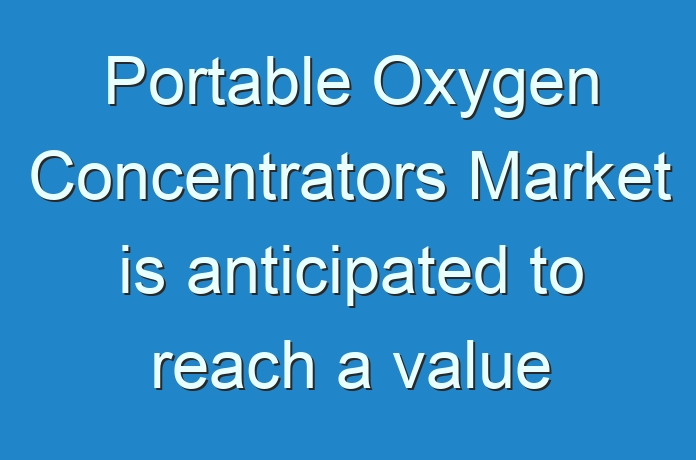
Transparency Market Research (TMR) has published a new report titled ‘Portable Oxygen Concentrators Market- Global Industry Analysis, Size, Share, Growth, Trends, and Forecast, 2018–2026.’ According to the report, the global portable oxygen concentrators market was valued at above US$ 1 Bn in 2017. The market is anticipated to reach a value of about US$ 3.1 Bn by 2026, expanding at a higher single digit CAGR during the forecast period. Rise in COPD patient population, increase in other lung conditions, and surge in geriatric population are expected to augment the global market from 2018 to 2026. The global portable oxygen concentrators market is projected to expand, owing to the acceptance and rise in the demand for supplemental oxygen therapy ambulatory device and strong reimbursement policies.
Request Brochure for Report – https://www.transparencymarketresearch.com/sample/sample.php?flag=B&rep_id=1689
Rise in chronic obstructive pulmonary disease (COPD) population is propelling the global portable oxygen concentrators market
The global portable oxygen concentrators market is expanding at a high growth rate, driven by the prevalence of chronic obstructive pulmonary disease (COPD). This is an umbrella term used to describe various progressive lung diseases, such as emphysema, chronic bronchitis, and refractory asthma. Patients suffering from severe COPD require continuous supply of oxygen. According to WHO, COPD is the fourth-leading cause of death in the world, with approximately 2.75 million deaths per annum. The WHO predicts that COPD would be the third-leading cause of death by 2030. According to the CDC, over 16 million people in the U.S. are living with respiratory disorders such as lung cancer, COPD, and heart diseases, caused due to smoking.
Increase in the global geriatric population is driving the need for oxygen therapy, such as portable oxygen concentrators, to improve mobility and fight respiratory conditions
Rising geriatric population globally is driving the demand for portable oxygen concentrators among this population, in order to carry out their daily routine. The geriatric population often suffers from certain chronic respiratory diseases that affect their mobility; hence, their dependence on portable oxygen concentrators helps improve the quality of their life. Rise in the geriatric population demands better treatment options, which in turn is likely to provide opportunities to companies that operate in the global portable oxygen concentrators market. According to the United Nations, the geriatric population, or people above the age of 60, is expected to double by 2050, and triple by 2100. It is projected to rise from 962 million in 2017 to 2.1 billion by 2050 and reach 3.1 billion by 2100. Globally, the geriatric population is the rising at a rapid pace, as compared to the population growth rate of the younger age group.
Request for Analysis of COVID19 Impact on Portable Oxygen Concentrators Market – https://www.transparencymarketresearch.com/sample/sample.php?flag=covid19&rep_id=1689
North America dominates the global portable oxygen concentrators market owing to rise in awareness, technological advancements, and strong reimbursement policies
North America dominates the global portable oxygen concentrators market owing to technological advancements, availability of portable oxygen concentrators, rise in incidence of COPD, and supportive government policies. Moreover, aging baby boomers would create a demand for oxygen therapy, including portable oxygen concentrators, to help them lead a comfortable life. According to the U.S. Census Bureau, all baby boomers are expected to be older than the age of 65 by the year 2030. In the U.S., the coverage provided by Medicare is 80% of the cost of the oxygen therapy devices, which helps patients to access this device.
Development of portable oxygen concentrator for toddlers offers significant opportunities to the market
According to the WHO, acute respiratory infections account for deaths of 4 million children each year; of these, 2.6 million are infants and 1.4 million are children aged between 1 years and 4 years. Moreover, cases of asthma in children are increasing with each passing year, which may further increase a risk of developing COPD condition. A few portable oxygen concentrators that are suitable for the children include Lifechoice ActivOx Pro 4L and the Respironics SimplyGo Mini. Neonatal respiratory conditions can arise due to several reasons such as delayed adaptation of extra uterine life, existing conditions such as surgical or congenital anomalies, or from acquired conditions such as pulmonary infections pre and post-delivery. Portable oxygen concentrators are small and lightweight and hence, are easy to carry for patients suffering from chronic respiratory diseases. Portable oxygen concentrators have several other benefits that make them the ideal choice of device in the oxygen therapy market. It purifies the air continuously from the atmosphere, removes nitrogen to deliver oxygen rich air, purifies oxygen via nasal cannula, and runs on rechargeable lithium batteries, thereby eliminating the need for continuous electric supply. Therefore, portable oxygen concentrators can be future oxygen delivery device for toddlers.
BUy Portable Oxygen Concentrators Market Report –
https://www.transparencymarketresearch.com/checkout.php?rep_id=1689<ype=S
Investments and mergers & acquisitions by key players are driving the portable oxygen concentrators market
Key players dominating the global portable oxygen concentrators market are ResMed, Invacare Corporation, Medical Depot, Inc. dba DeVilbiss Healthcare, Precision Medical, Inc., O2 Concepts, LLC. , GCE Group, CAIRE Inc. (Chart Industries), Inogen, Besco Medical Co., LTD, and Koninklijke Philips N.V. Major players are focusing on mergers and acquisitions and are investing in the development of portable oxygen concentrators and making them available to the patient population.
Contact
Transparency Market Research,
90 State Street, Suite 700,
Albany, NY 12207
Tel: +1-518-618-1030
USA – Canada Toll Free: 866-552-3453





